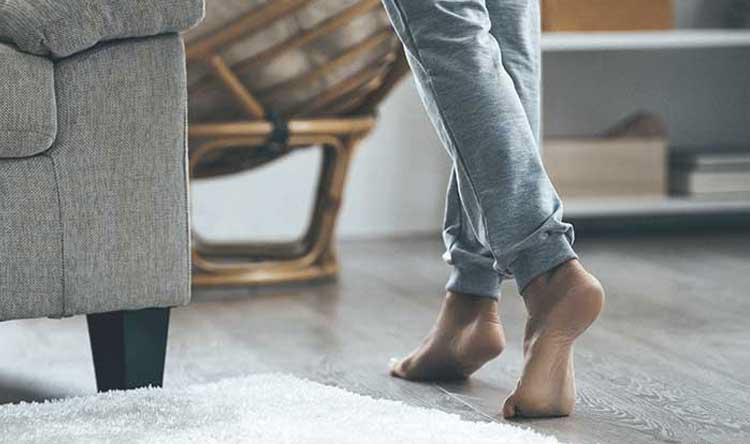That’s why you don’t walk barefoot at home


Walking barefoot can have good benefits but at the same time there may be other disadvantages.
According to the report published by the Boldsky website, experts advise against walking barefoot at home for several reasons, and some pediatricians, who specialize in treating foot or lower leg problems, suggest that walking barefoot indoors leads to problems and structural damage to the feet.
1- Knee and back pain
Walking barefoot impairs foot function, causing knee and back pain. Barefoot feet are compromised and their vital function is negatively affected, especially when walking on hard surfaces, which causes tremendous stress to the feet and the rest of the body.
Experts explain that when walking barefoot, the feet flip for longer periods, altering the biomechanics and distribution of weight and pressure on the foot. This imbalance can affect other parts of the body, such as the knees and back. Thus, a person can feel pain after a long day of walking barefoot or wearing shoes that do not support the arch of the foot, such as flip-flops and other flat shoes. According to Al Arabiya Net.
And when a person gets older, experts advise not to walk barefoot at home, especially women over the age of fifty who lose the fatty cushion in the foot, which reduces its cushioning, and thus reduces its ability to protect the knees, thighs and lower back from injury.
2- Imbalance and deformities in the foot
The imbalance caused by walking barefoot on hard surfaces can lead to the development of underlying foot deformities, such as bunions, and will lead to painful conditions such as heel pain, posterior tendonitis, and Achilles tendinitis.
3- Infection
Walking barefoot also exposes bacteria and fungi, which can infect the skin and nails. Infections caused by bacteria and fungi can affect the look, smell, and comfort of the feet.
4- Exacerbation of diabetes symptoms
Diabetics should not walk barefoot in public places to avoid skin infections. Skin infections, such as a fungus, can affect the hydration of the skin of people with diabetes, changing its texture and color and causing it to swell. Dryness and stiffness can cause cracks in the skin, increasing the chance of developing another infection. Because of their weakened immunity, diabetics can have a more difficult time fighting infection, exacerbating symptoms and complications of infection.
Walking barefoot on carpet, grass, or sand can be helpful, but you shouldn’t walk barefoot on hard surfaces such as tiles or mosaics.
Experts explain that walking barefoot on soft surfaces can help improve blood circulation, which helps nourish the nerves, muscles and bones of the feet and reduce swelling. Walking barefoot also improves the strength and flexibility of the foot muscles and ligaments, improves foot function and improves posture and balance, so it’s okay to walk barefoot on a clean, smooth surface from time to time.
=




